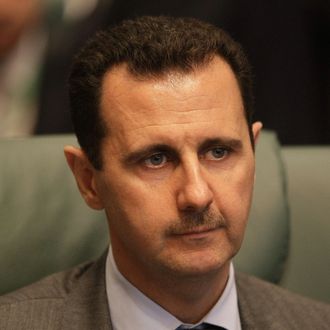
With a U.S. strike in Syria looking all but certain, more details have emerged on what convinced U.S. officials that the Assad regime carried out a chemical weapons attack in the suburbs of Damascus last week. According to The Wall Street Journal, Israeli spy services provided evidence that chemical weapons were moved to the area before the attack, and satellite images reviewed by the Obama administration on Sunday showed Assad was trying to cover up evidence by continuing to shell the site of the attack. Foreign Policy reports that some of the most persuasive evidence was found in communications intercepted by U.S. intelligence. In a series of “panicked phone calls,” an official at the Syrian Ministry of Defense demanded answers for the attack from a leader of a chemical weapons unit. While providing evidence that nerve gas was used, the calls highlight one of the biggest unanswered questions: Why would President Bashar al-Assad launch such a massive chemical attack?
Last week, Syrian officials called the allegations “illogical and fabricated,” and many are puzzled as to why Assad would massacre civilians when he’s been keeping the rebels at bay and U.N. weapons inspectors had just arrived in the country. Several theories have emerged, one of the most far-fetched being that Assad didn’t know about the attack beforehand. A U.N. official told Bloomberg on Tuesday that the president’s younger brother Maher al-Assad, who commands the Republican Guard and the Syrian Army’s elite 4th Armored Division, is suspected of giving the order. Joshua Landis, director of the Center for Middle East Studies at the University of Oklahoma says he finds the idea “inconceivable,” as “there has been nothing to indicate that Bashar is just a figurehead.”
Assad has been gradually escalating attacks in civilian neighborhoods where there’s strong support for the rebels, and according to the New York Times, some analysts believe he meant to launch a smaller attack and miscalculated. Or it’s possible that Assad was emboldened by the international community’s failure to act when he was accused of crossing Obama’s “red line” several months ago. The Times reports that there are a number of strategies that might not be apparent to outsiders, but make sense to the Syrian regime, such as “further terrorizing rebel supporters, projecting confidence by defying the international community, or simply wanting to raise the military pressure on some of the most stubborn and strategic pockets of rebel fighters and their backers.”
While the U.S. is expected to release an intelligence report laying out its evidence against Assad in the coming days, it’s unlikely to delve into his motives. For now, Foreign Policy has the best summation of the U.S. government’s thinking on the issue: “We don’t know exactly why it happened,” said an intelligence official. “We just know it was pretty fucking stupid.”






























